Recently, my friend Robert made a heartfelt social-media post inquiring about Orthodox Christians who claim that anyone participating in political discourse is “worshiping false idols.” Here’s how I began my comment to his query.
“I find that the people who promote what you’re saying most definitely have a political bent themselves. It’s just that you disagree with them and want to dialog, but they’re sure they’re right so then your stance is in turn called ‘disunity.’ This is projection, and it’s at the heart of cancel culture and only feeds into the boiling hostility and division that envelopes us. Freedom of conscience is something God endowed in us, and it should be celebrated, as long as you’re not preaching heresy.“
We all know these kinds of Christians. They question not only your faith, but your salvation, if you dare to challenge the leftist status quo. Robert is a catechumen, which means he’s being trained in doctrine and discipline before his chrismation into the Orthodox faith, so I tried to get out in front of the curve and set the tone before the do-gooders could dog-pile on this catechumen who is sincerely seeking information and guidance. If there’s one thing I’m good at, it’s having an intellectually curious person’s back.
I continued: “Moreover, bishops put out political statements all the time. They don’t think they’re political, but if you’re not of the ‘social justice’ worldview, they most certainly are. Simply using bad American history and faulty data is highly political, and that is an all-too-common theme amongst the most learned of Orthodox.“
I’ve referenced this trend before in my 2-part “Twisted tongues” series, Beacons of light and Salt of the earth, which tackled the hierarchs’ penchant for supporting illegal immigration by using the progressive “America is an idea” ideology. And now the bishops are at it again, pushing historicity in support of egalitarianism.
As historian Brion McClanahan explains, these left-ese slogans have “become ingrained into our political lexicon.” For instance, why do people (like bishops) cite only one part of the Declaration (a very political document) and not “mention the last paragraph?,” McClanahan asks. “Because it annihilates the entire idea of a ‘proposition nation.'”
“If the War produced 13 ‘FREE AND INDEPENDENT STATES,'” he continues, “then how could we have a ‘nation where all men are created equal?'” We can’t. And maybe I shouldn’t expect clergy to grasp that, since that’s even a hard sell for 99.9% of the rest of ‘Murica, including most academics. But I do expect clergy to be cautious of using ahistorical abstractions or presentist opinions to buttress their statements; anything less is irresponsible. I say, stick with Scripture, fathers.
Oddly, Metropolitan Tikhon also wrote, “As the Church, in which ‘there is neither Jew nor Greek, slave nor free,’ we oppose racism.” I mean, surely he know that the next line in Galatians 3:28 is “nor is there male and female,” which is a favorite of the trans activists, right? Bend the knee to placate BLM and the open-borders globalists, and you’ll soon be knee deep in LGBT lunacy.
I concluded: “My patron saint is Ilia the Righteous of Georgia. He fought against the Russification of his people and for their borders, language, and culture (all political issues in 2020) but always through the lens of his nation’s Orthodox faith. He was what you would call a Georgian patriot, thus, he was murdered by his political enemies in 1907.“
“If you’re seeking truth and peace, there’s nothing wrong with challenging political conformity based upon incorrect info, especially when we live in a government-meddling society where everything – marriage, the family, education, sexuality, owning a small business, self-defense, food, housing, travel, health, medicine, and even church – is political. Heck, if using polemics against Empress Eudoxia was good enough for St. John Chrysostom, it should be good enough for us. Be bold but loving: that’s my mantra.”
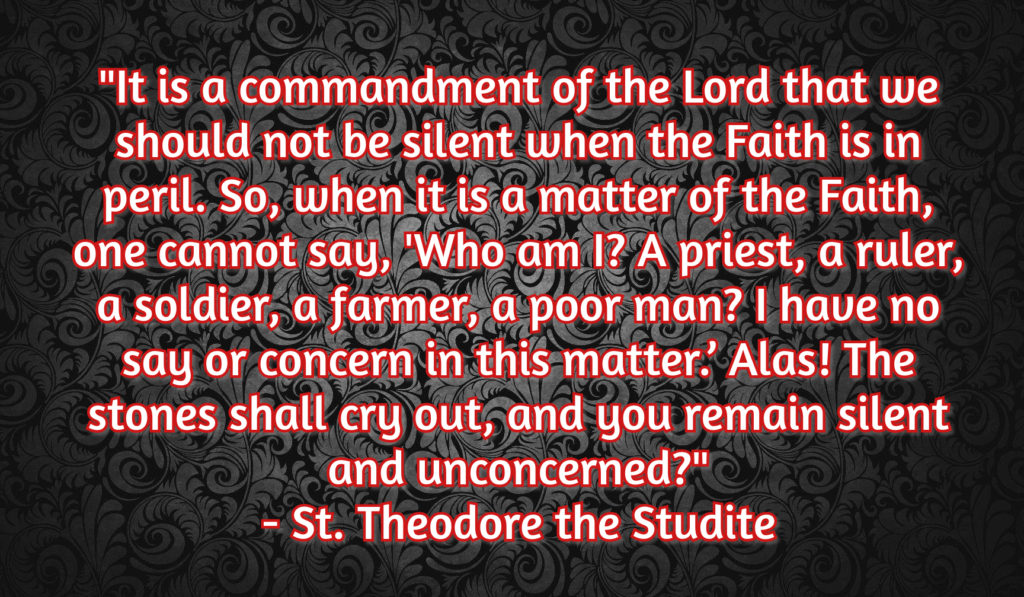
Christian finger-wagging at conservatives who buck the fashionable opinions of the day is not a strictly Orthodox thing, of course. Years ago, I coined the term “evangeleftism” in order to try to describe the Protestant version of this curious and troubling phenomenon that seems to be embedded within much of American Christianity, no matter the church.
When liberals and left-wingers urge people with whom they disagree to “stop being so political,” while they simultaneously act and speak political, it’s an Ameridox contrivance, which is built upon a purely modern American idol. And its goal is to stifle dissent and smash God.
As my friend Dave Benner writes, “The United States Constitution does not contain the words ‘separation of church and state,’ nor does it require the general government to purge all religious influence from public institutions.”
“To the contrary of modern conceptions,” he continues, “the document does not require that elected officials abstain from making decisions based on religious proclivities, nor does it call for government to intervene to prevent religious influence in government.”
Christians in the rest of the Christian world get this. They understand that there can be no part-religious/part-secular life, that it’s all the same thing. Maybe America and the West as a whole wouldn’t be in the “shit hole” predicament we’re in if Christians hadn’t forgotten this.
Maybe this is why conservatives and traditionalists lost the Culture War: because we fell for the myth. Maybe we should’ve concentrated on putting devout brethren into positions of power, as opposed being duped by secular Orthodox like Secretary of State Mike Pompeo, Catholics like Chief Justice John Roberts, and Benedict-Arnold Protestants who make up the majority of Christians in Congress. They are loyal opposition at best, traitors at worst.
Maybe we should’ve loudly protested Orthodox Tim Tassopoulos when he sold out his faith for money. Maybe we should’ve ignored Orthodox Rod Dreher‘s advice in “The Benedict Option” of withdrawing from and abandoning politics, and living as “exiles in our own country.” Maybe we should’ve appreciated the double-headed eagle, understood that Christendom flourished due to the interconnectedness of Church and State, and that Christians should most definitely use politics to uphold and promulgate truth, beauty, and goodness.
Not all Christians are made to take bold, controversial stands, debate, or even ask unpopular questions. Strangely, it seems that those who aren’t spend their time trying to convince and/or castigate those who are. We never seem to be celebrating the true diversity of spiritual gifts and using them for a shared purpose: to protect the faith, spread the Gospel, and glorify the Lord. Nope, just wear your mask and shut up, trouble-maker.
We “rabble-rousers” can take heart in the history and work of St. Job of Pochaev, who lived during a time of great turmoil within the Church and was a master at conveying ideas in mediums that could reach his 16th-century contemporaries. His Akathist describes him as an “unconquerable defender of and struggler for the Eastern-Orthodox catholic faith against the falsely-minded West.”
Whereas St. Job was a monk, St. Constantine was an emperor and is another example of note. Below is a homeschool paper my then-age-10 son wrote about him last spring.
St. Constantine’s canonization is a touchy subject for some, but thank God he was willing to use politics for the furtherance of Christianity. Our battles may be different currently, but the war is still the same. I say, screw the Benedict Option and the tyranny of the Benedict Arnolds. The Constantine Option is what we should embrace today and reinvigorate for the future.

At top: The icon illustrates the historic Council of Nicea, which was assembled by Constantine (seen at center in red crown and robes).
“Constantine the Christian warrior“
Like an architect, Constantine built up the Church greatly. He was born on February 27, 272 A.D. in Naisus, Serbia, which was part of the Roman Empire. Constantine’s father was one of the four caesars of the empire’s vast lands. Wanting to be like his powerful dad, Constantine would emerge as a politician, too. Although, his mother came from humble beginnings, she influenced Constantine on Christian beliefs. Because of the impression his parents made upon him, Constantine became a prestigious leader of both Rome and Christianity.
When he became Supreme Augustus, Constantine used his power to spread Christianity all over the civilized world. In 302 A.D., Diocletian abdicated the throne. There were numerous civil wars, and there was chaos between caesars because they were all vying for authority over the colossal Roman Empire. In 312 A.D., Constantine fought the bloody and brutal Battle of Milvian Bridge against his rival Maximius. Some historians claim he was told in a vision that he needed to be the guardian of Christians. Constantine saw “XP,” which are the first two letter in the Greek word for Jesus, and he also saw “Hoc Vince.” That means “Conquer by the Cross.” Constantine’s soldiers painted crosses on their shields and he easily defeated Maximius. Impressively, Constantine conquered other kings and huge armies.
It took Constantine 18 years and a series of battles and wars to finally become Augustus of the East and West parts of the empire in 324 A.D. He fashioned extravagant landscapes and nicely made roads, and protected many Christian kingdoms. Constructing beautiful cities, Constantine often used his own money and manufactured churches as shrines to Christianity. He established a new capitol, which was an old Greek city called Byzantium, rebuilt it, and called it “Nea Roma.” But after his death, this majestic city’s name was changed to “Constantinople.” Even though Constantine used much of his political power to advance himself, he also helped Christians significantly.
Constantine’s faith evolved over the passing years. Constantine’s mother, who found the true cross and is an honored saint in the Orthodox and Catholic churches, was an immense Christian influence on him. She was also the first Christian pilgrim and was extremely devout.
Constantine was politically careful about his faith. If he declared “I love Christians!” everyone would kill all the Christians and there wouldn’t be any today. Patiently, he waited till he was Supreme Augustus to proclaim his Christianity, but he still played it safe. Making it the law that Christians had to be accepted into society, Constantine created the Edict of Toleration in 311 A.D. The caesar Galatius ignored it. Because of this, Constantine implemented the Edict of Milan, which legalized Christianity in 311 and returned all stolen church property.
Constantine organized the Council of Nicea in 325 to close pagan temples. While Constantine was pro-Christian, he didn’t get baptized until his death bed. He died on May 22. The year was 337. He was 65 years old. Although it took him a while to get there, Constantine was the first Roman emperor to convert to Christianity.
Truly, if Constantine hadn’t supported Christians, there would be a lot fewer today. Constantine instituted Sunday as a day of worship. He dealt with schisms, and he called the First Ecumenical Council, which is where people come together to call out corrupt teachings and to decide what important beliefs Christians should have. It also deftly destroyed the popular heresy of Arianism. Arius taught that there was no Trinity. That God is Father. But Jesus is inferior. Father and Son aren’t equal.
At the Council, Constantine remarked, “For my own part, I hold any sedition within the Church of God as formidable as any war or battle, and more difficult still to bring to an end. I’m consequently more opposed to it than anything else.” That meant that the fighting for true Christian doctrine at the Council was as hard to do as the work of soldiers and was also as momentous.
The Ecumenical Council also produced the Nicene Creed, which is a creed we still sing today, and another name for this special gathering is the Council of Nicea. In the Orthodox Church we still sing hymns to Constantine and his mother. Because he promoted Christianity, his saint title is “Equal to the Apostles.” Constantine preserved peace and the faith for the ages.
Constantine the Great was an adroit military man and politician, who also revered Christ. Although, he was a Christian, his faith progressed slowly over the years but he was cautious. Seriously, Constantine’s legacy as a resolute leader made the Church more durable. Without him, who knows what Christianiaty would be like today? Constantine was a Christian warrior.
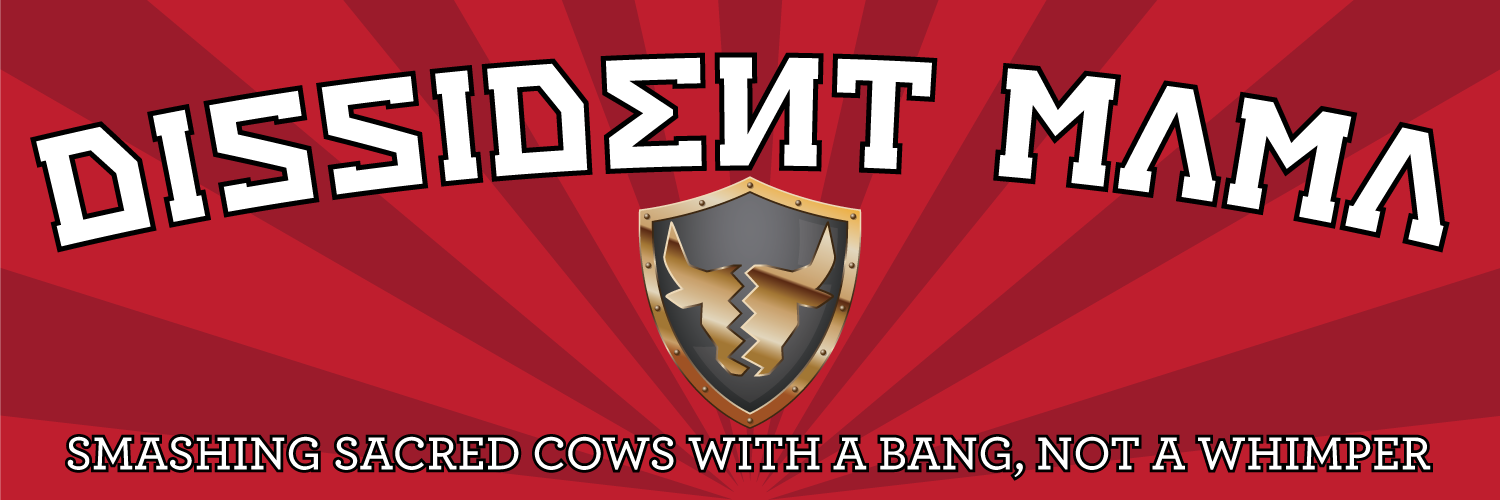
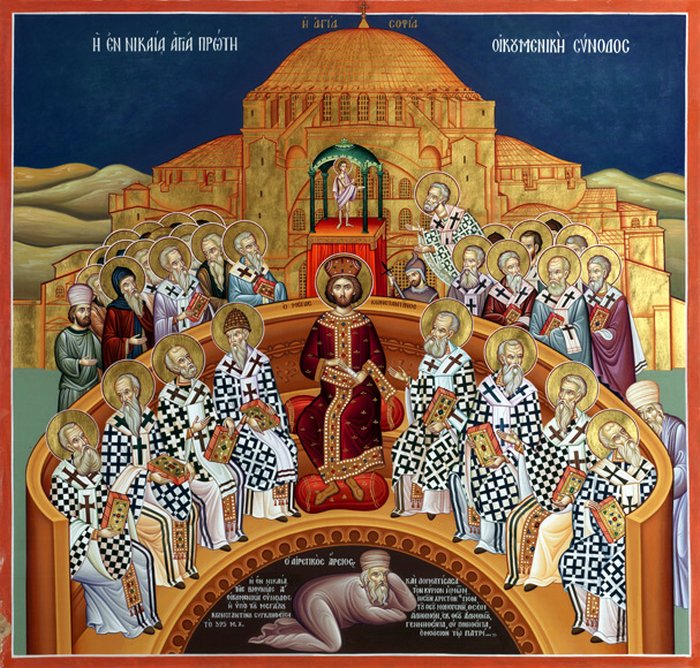

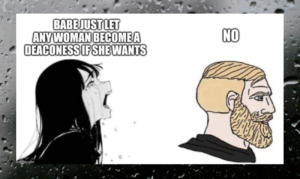
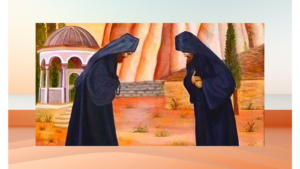
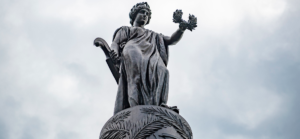
Comments
Thanks for this article Mama! This marks the second paper of your son’s that I have read here. He’s a lucky young man to have you for a mother and teacher.
Constantine was indeed a Christian warrior.
Now I have to follow all the links in the article.
Thank you for reading and commenting. I really do appreciate the time and effort, especially when you’re saying such nice things. 🙂
Stay “Constantine” tough out there, brother!
Thanks for the article. Constatine is a good example to follow. That said, one only needs to look to Iran or to history, with the Tudor Dynasty (King Henry VIII and Elizabeth I) to see what happens when religion makes too much of an inroad into government. There is a tendency among egomaniacs that run government to erect monuments to themselves and codify the worship of mortals. One only needs to look to Julius Caesar (although he wasn’t the first, he was the most well known) to see what happens when a egomaniac runs the government.
Thanks for commenting, Eileen. I think the double-headed eagle is such a foreign concept to the West that it’s hard for Americans to wrap their heads around it. I truly believe that if the church had been given it’s due, we would not be in the leftist predicament we’re in now. And it didn’t have to be a federal thing, of course, but at the state level, just like it was in colonial times. State religions that reflect each state’s unique people is waaaaaaaaaaay better than pluralism, which has been an utter failure.
Washington said we need government because men aren’t angels, but I’d say government needs Christianity specifically because men ARE devils and a greater influence of the Church would help to keep those in office in line with the faith. We are toiling away under a godless government, one with many, many Julius Caesars who push their sick, secular religion with its blood sacrifices and other devlish rituals, and I think it’s undeniable that the “wall of separation” mythos has undergirded that system.
Thanks for commenting, Eileen. I think the double-headed eagle is such a foreign concept to the West that it’s hard for Americans to wrap their heads around it. I truly believe that if the church had been given it’s due, we would not be in the leftist predicament we’re in now. And it didn’t have to be a federal thing, of course, but at the state level, just like it was in colonial times. State religions that reflect each state’s unique people is waaaaaaaaaaay better than pluralism, which has been an utter failure.
Washington said we need government because men aren’t angels, but I’d say government needs Christianity specifically because men ARE devils and a greater influence of the Church would help to keep those in office in line with the faith. We are toiling away under a godless government, one with many, many Julius Caesars who push their sick, secular religion with its blood sacrifices and other devlish rituals, and I think it’s undeniable that the “wall of separation” mythos has undergirded that system.
Julius Caesar, though a pagan, was actually a good man. He was protecting Rome from corruption.
In Rodney Stark’s book, “The Triumph of Christianity”, he has a chapter entitled “The Very Mixed Blessings of Constantine”, wherein he argues in a succinct concluding paragraph that:
“The creation of a rich, powerful, and intolerant Christian church was the primary legacy of the conversion of Constantine. Far better that he had remained a pagan who opposed religious persecution, while allowing Christian diversity to flourish.”
I’m not sure that what will solve our problems would be a state subsidized church. Whatever were Constantine’s virtues, and they were many I’m sure, he is basically the patron saint of state subsidy to churches. Though if the battle lines were drawn and on one side were Constantinian Christians and on the other were atheist libertarian libertines, I’d certainly grab a Chi Rho shield and do my duty for Christ.
“Constantine was a Christian warrior.”
No doubt, and we need more of those today.
On a final note, the Christian population would have survived just fine without Constantine’s patronage. According to Stark, the Christian population had reach about 50% of major cities in the empire, including that of Rome, so it’s not like they were in danger of being wiped out.
“I’d certainly grab a Chi Rho shield and do my duty for Christ”
…runs off to make just such a shield…
The shield is metaphorical. But a Chi Rho AR-15 would be handy! In all honesty, the crusader mentality can get a little out of hand. But as long as we remember that great G.K. Chesterton line, which I believe captures the spirit of Christian warfare most succinctly, that “the only defensible war is a war of defense, ” I believe we’ll be on the right track.
TL, I think the double-headed eagle is such a foreign concept to the West that it’s hard for Americans to wrap their heads around it. I truly believe that if the church had been given it’s due, we would not be in the leftist predicament we’re in now. And it didn’t have to be a federal thing, of course, but at the state level, just like it was in colonial times. State religions that reflect each state’s unique people is waaaaaaaaaaay better than pluralism, which has been an utter failure.
From what I know about Stark, which is admittedly not too much, is I think he sees conversion as an uber-individualist position. Again, that’s such an American way to look at it. Many people throughout history became Christians because their leaders did, and they did so because they were part of that society, but then led devout lives afterward, teaching the faith to the offspring, and then them to theirs, and so on. It’s like baptizing a baby; he has no choice in the matter, but if he’s raised in the faith and indoctrinated (literally immersed in Christian doctrine) in the home, then his chances of not falling away are pretty darn good. It’s both individual AND collective. Just my two cents.
Well you’ll get no argument from me against the idea that where the Church diminished in influence, the state and its madness increased.
In the West, liberty grew up in the spaces between the political authorities of the multitude of kingdoms and the social authority of the Western Church. When the autonomy of the Church was captured by a king or emperor, it typically meant that the Church became less Godly and more corrupt. When the Western Church was splintered and the various fragments became each subject to a local secular authority, it was the beginning of the end for the social authority of Christianity.
I think that what we need is not a state church, but an autonomous international church which can exert powerful social influence on regional political authorities. One like the Catholic Church, if it wasn’t infiltrated by gays and Leftists. I’m hoping that a conservative leader within the Catholic church will break off and start a new Western Church. The old Catholic church can have the Vatican. It’s just worldly stuff anyway.
I don’t know though. It’s a complex issue. I certainly don’t have all the answers. Perhaps the Church I’m hoping for would have to start out as a state sponsored and protected church before it branched out and became international and autonomous.
Well, the Orthodox Church is universal and autonomous. It’s hierarchical but bottom-up with varied jurisdictions that do in some places have a great deal of regional political authority, and no pope, of course. The social authority of Christianity lasted for much longer in the East for the very reason that it did work in concert with the state, which wielded by sword religious edicts and norms, while it served to keep the politicians and policies in check spiritually.
Now, modern-day Orthodoxy has more than its fair share of problems, such as leftist creep here in Murica (shocker, right?!) and lots of EU, NATO, and US meddling in its strongholds in the East (Russia, Ukraine, Georgia, Greece, Serbia, etc.) Foreign ideologies, ike Marxism, liberalism, LGBT, and feminism, are always trying to tear it down, cause division, and spark schism, and because of its weakness politically, it often times has a hard time withstanding the storm … well, that, and lots of lots of subversives within. Funny how that always seems to be the case: heretical Christians stirring the pot.
Anyhoo, like you said, I certainly don’t have all the answers nor do I know all the machinations of the deep history of it all. But what I do know is that Jesus said that the gates of Hell will not prevail, and in that, there is all the hope we need. Stay tough, brother!
I’d like to know your thoughts on Jo Jorgenson, especially on her recent Twitter statements supporting BLM and saying that being an “anti-racist” is an imperative. I was really disappointed. It pretty much swung my vote to Trump. I’m so tired of libertarians pandering to the Left from a cultural perspective. Anti-racism and Jorgenson might be a good dual topic for a future post of yours. I know I would want to read that.
Not a fan. I mean, I’m for repealing 19A, so a chick commander in chief isn’t my thing. Moreover, like you said, her “anti-racism” is predictable and pathetic. Couple that with her open-borders stance, and I’m all for running her out on a damn rail. I don’t even know her position on abortion, but my guess is it’s the typical “my body, my choice” fare we get from the LP.
I think Rose Wilder Lane said it best, when she said that she was against women voting. But also against men doing the same. But yes I think men are more natural political leaders, but I’m open to the idea of a great female leader. I just haven’t seen one yet. To be fair, it’s not like I’ve seen very many good male leaders either.
Yes I imagine that she is pro abortion. I could be wrong about that though.
We may get to a point where women have to be the ones to rise up and take on the madness just ’cause, like in my case, my hubs is the breadwinner and he’s busy providing for his family in this precarious cancel culture. It’s quite the pickle conservative men are in these days. But traditionally, I think women’s role is to back their husbands in virtuous and noble pursuits, and to raise kind, but courageous sons (gentlemen) and mighty, but submissive (to honorable men and God) daughters (ladies). Southern women didn’t need feminism; they already had power and respect because they were matriarchal and bold, sometimes spicy as hell and other times meek but with a quiet strength and dignity that spoke volumes; still, they knew their place in the pecking order. This order has been smashed and we’re all paying the price for it today.
https://uploads.disquscdn.com/images/e39b73c0168a5422a48d368b09729f8857b5040a98d1e417bbb2e3ce5aade064.jpg
We may get to a point where women have to be the ones to rise up and take on the madness just ’cause, like in my case, my hubs is the breadwinner and he’s busy providing for his family in this precarious cancel culture. It’s quite the pickle conservative men are in these days. But traditionally, I think women’s role is to back their husbands in virtuous and noble pursuits, and to raise kind, but courageous sons (gentlemen) and mighty, but submissive (to honorable men and God) daughters (ladies). Southern women didn’t need feminism; they already had power and respect because they were matriarchal and bold, sometimes spicy as hell and other times meek but with a quiet strength and dignity that spoke volumes; still, they knew their place in the pecking order. This order has been smashed and we’re all paying the price for it today.
https://uploads.disquscdn.com/images/e39b73c0168a5422a48d368b09729f8857b5040a98d1e417bbb2e3ce5aade064.jpg
I prefer a saved America than say, Russia or China.
Indeed I wished a Protestant version of Constantine there or in a NATO Western European country.
Greetings from Indonesia, where most Christians there are Prots.
Author
Greetings from North Cackalacky!